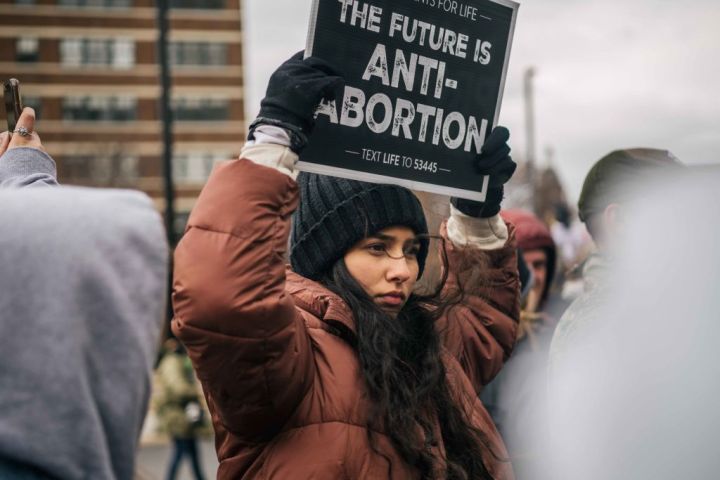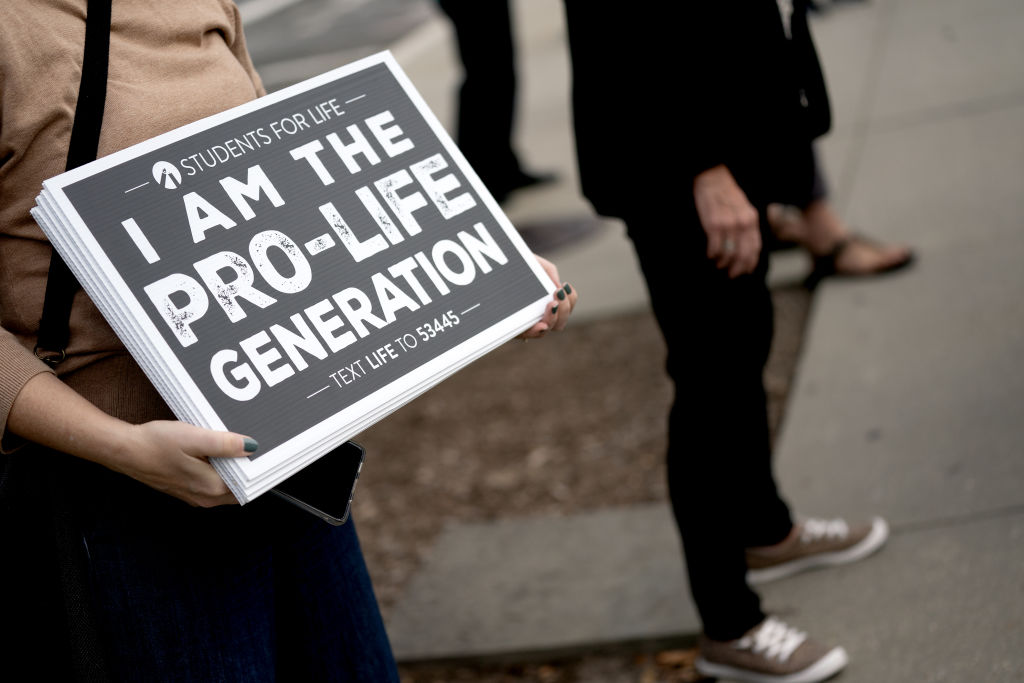THE CONVERSATION
What really drives anti-abortion beliefs? Research suggests it’s a matter of sexual strategies

Some reasons people oppose abortion seem to be at odds with other positions they hold. Evolutionary social science points to a surprising motivation for anti-abortion attitudes.
Many people have strong opinions about abortion – especially in the wake of the US Supreme Court decision that overturned Roe v. Wade, revoking a constitutional right previously held by more than 165 million Americans.
But what really drives people’s abortion attitudes?
It’s common to hear religious, political and other ideologically driven explanations – for example, about the sanctity of life. If such beliefs were really driving anti-abortion attitudes, though, then people who oppose abortion might not support the death penalty (many do), and they would support social safety net measures that could save newborns’ lives (many don’t).
Here, we suggest a different explanation for anti-abortion attitudes – one you probably haven’t considered before – from our field of evolutionary social science.
Why do people care what strangers do?
The evolutionary coin of the realm is fitness – getting more copies of your genes into the next generation. What faraway strangers do presumably has limited impact on your own fitness. So from this perspective, it is a mystery why people in Pensacola care so strongly about what goes on in the bedrooms of Philadelphia or the Planned Parenthoods of Los Angeles.
The solution to this puzzle – and one answer to what is driving anti-abortion attitudes – lies in a conflict of sexual strategies: People vary in how opposed they are to casual sex. More “sexually restricted” people tend to shun casual sex and instead invest heavily in long-term relationships and parenting children. In contrast, more “sexually unrestricted” people tend to pursue a series of different sexual partners and are often slower to settle down.
These sexual strategies conflict in ways that affect evolutionary fitness.
The crux of this argument is that, for sexually restricted people, other people’s sexual freedoms represent threats. Consider that sexually restricted women often get married young and have children early in life. These choices are just as valid as a decision to wait, but they can also be detrimental to women’s occupational attainment and tend to leave women more economically dependent on husbands.
Other women’s sexual openness can destroy these women’s lives and livelihoods by breaking up the relationships they depend on. So sexually restricted women benefit from impeding other people’s sexual freedoms. Likewise, sexually restricted men tend to invest a lot in their children, so they benefit from prohibiting people’s sexual freedoms to preclude the high fitness costs of being cuckolded.

A demonstrator holds pro-life signs during a prayer ceremony in front of the U.S. Supreme Court in Washington, D.C., the US, on Monday, Oct. 4, 2021. Image: Stefani Reynolds / Bloomberg / Getty Images
Benefiting from making sex more costly
According to evolutionary social science, restricted sexual strategists benefit by imposing their strategic preferences on society – by curtailing other people’s sexual freedoms.
How can restricted sexual strategists achieve this? By making casual sex more costly.
For example, banning women’s access to safe and legal abortion essentially forces them to endure the costs of bearing a child. Such hikes in the price of casual sex can deter people from having it.
This attitude is perhaps best illustrated by a statement from Mariano Azuela, a justice who opposed abortion when it came before Mexico’s Supreme Court in 2008: “I feel that a woman in some way has to live with the phenomenon of becoming pregnant. When she does not want to keep the product of the pregnancy, she still has to suffer the effects during the whole period.”
Force people to “suffer the effects” of casual sex, and fewer people will pursue it.
Also note that abortion restrictions do not increase the costs of sex equally. Women bear the costs of gestation, face the life-threatening dangers of childbirth and disproportionately bear responsibility for child care. When women are denied abortions, they are also more likely to end up in poverty and experience intimate partner violence.
No one would argue this is a conscious phenomenon. Rather, people’s strategic interests shape their attitudes in nonconscious but self-benefiting ways – a common finding in political science and evolutionary social science alike.
Resolving awkward contradictions in attitudes
An evolutionary perspective suggests that common explanations are not the genuine drivers of people’s attitudes – on either side of the abortion debate.
In fact, people’s stated religious, political and ideological explanations are often rife with awkward contradictions. For example, many who oppose abortion also oppose preventing unwanted pregnancy through access to contraception.
From an evolutionary perspective, such contradictions are easily resolved. Sexually restricted people benefit from increasing the costs of sex. That cost increases when people cannot access legal abortions or prevent unwanted pregnancy.
An evolutionary perspective also makes unique – often counterintuitive – predictions about which attitudes travel together. This view predicts that if sexually restricted people associate something with sexual freedoms, they should oppose it.
Indeed, researchers have found that sexually restricted people oppose not only abortion and birth control, but also marriage equality, because they perceive homosexuality as associated with sexual promiscuity, and recreational drugs, presumably because they associate drugs like marijuana and MDMA with casual sex. We suspect this list likely also includes transgender rights, public breastfeeding, premarital sex, what books children read (and if drag queens can read to them), equal pay for women, and many other concerns that have yet to be tested.
No other theories we are aware of predict these strange attitudinal bedfellows.
Behind the link to religion and conservatism
This evolutionary perspective can also explain why anti-abortion attitudes are so often associated with religion and social conservatism.
Rather than thinking that religiosity causes people to be sexually restricted, this perspective suggests that a restricted sexual strategy can motivate people to become religious. Why? Several scholars have suggested that people adhere to religion in part because its teachings promote sexually restricted norms. Supporting this idea, participants in one study reported being more religious after researchers showed them photos of attractive people of their own sex – that is, potential mating rivals.
Sexually restricted people also tend to invest highly in parenting, so they stand to benefit when other people adhere to norms that benefit parents. Like religion, social conservatism prescribes parent-benefiting norms like constricting sexual freedoms and ostensibly promoting family stability. In line with this, some research suggests that people don’t simply become more conservative with age. Rather, people become more socially conservative during parenthood.
Restricting everyone to benefit yourself
There are multiple answers to any “why” question in scientific research. Ideological beliefs, personal histories and other factors certainly play a role in people’s abortion attitudes.
But so, too, do people’s sexual strategies.
This evolutionary social science research suggests that restricted sexual strategists benefit by making everyone else play by their rules. And just as Justice Thomas suggested when overturning Roe v. Wade, this group may be taking aim at birth control and marriage equality next. DM/ML
This story was first published in The Conversation.
Jaimie Arona Krems is an Assistant Professor of Psychology at Oklahoma State University. Martie Haselton is a Professor of Psychology at the University of California, Los Angeles.

















 Become an Insider
Become an Insider
What a laughably one-sided perspective. What else, I wonder, does evolutionary social science say about the stability of the family unit within a society that is ‘sexually unrestricted’? Not much I would imagine because it is so stunningly new that it has no evolutionary precedent. Or that such societies tend to become so unstable and weak that they do not survive the rigours of evolutionary selection.
Here’s a brief alternative view.
Maybe the conservative perspective has survived the test of time because it promotes the strength of the community through promoting the strength of the individual. This in turn is rooted in the stability and of their upbringing, which is demonstrably better when under the auspices of a strong family unit. A strong family unit is by definition a partnership of parenthood that endures hardships where a single parent would undoubtedly be weaker due to one person having to do the work of two people.
It is thus not a case of taking away the rights of others or enforcing one’s beliefs onto others. It is about the creation of strong communities that consist of strong individuals because they understand the strength inherent in TAKING RESPONSIBILITY FOR YOUR ACTIONS.
Normalising irresponsibility (like free abortion) weakens society as a whole by keeping people in a child-like mindset well into adulthood, which in turn promotes a parasitic culture of dependence upon the state. Now which political ideology thinks this is perfectly ok, I wonder…
It is one-sided. For example “… If such beliefs were really driving anti-abortion attitudes, though, then people who oppose abortion might not support the death penalty (many do)” is one side of the story, but does not include the vice versa that most pro-abortionists are actually anti death sentence. Both points of view are contradictory, but the authors put only one view forward, as they do in the entire article. This notion of avoiding someone breeding you out or stealing your husband has to be the biggest load of excrement I’ve read in the past 50 years on this subject. My personal view is you’re either pro-life (i.e. NO ONE has the right to terminate your life) or you are pro-death (i.e. governments, organisations, individuals can determine the conditions under which your life can be taken). Simple as that – make up your mind on your own view point by all means, but don’t be hypocritical and don’t for one minute fall for the argument that abortion isn’t killing.
Pushing the envelope a little too far I fear, but nonetheless an interesting idea.